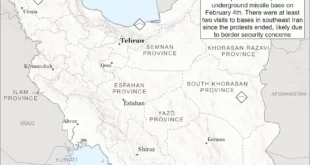 The ministers and other heads of delegation from member countries of the Non-Aligned Movement meeting in Tehran, Iran on Human Rights and Cultural Diversity issued a final statement, which among other things, supports establishment of a right center in Iran. The following is the full text of the declaration of the NAM meeting in Tehran.
The ministers and other heads of delegation from member countries of the Non-Aligned Movement meeting in Tehran, Iran on Human Rights and Cultural Diversity issued a final statement, which among other things, supports establishment of a right center in Iran. The following is the full text of the declaration of the NAM meeting in Tehran.
The ministers and other heads of delegation from member countries of the Non- Aligned Movement met in Tehran, Islamic Republic of Iran, on 3-4 September 2007, at the “ministerial meeting on human rights and cultural diversity”,
1. Renewing their commitment to promote and protect all human rights and fundamental freedoms including the right to preserve cultural identity which is a defining characteristic of humanity and forms a common heritage of humanity,
2. Emphasizing that tolerance, due respect for others and their rights to freely determine their own approach towards progressive development are fundamental values to international relations,
3. Recognizing that cultural diversity and the pursuit of cultural development by all peoples and nations are source of mutual enrichment for the cultural life of humankind,
4. Reaffirming the purposes and principles enshrined in the charter of the United Nations, underscoring the validity and relevance of the movement’s principled positions concerning inter alia, development of friendly relations among nation based on equal rights and, the right of all peoples to self-determination, by virtue of which they freely determine their political status and freely pursue their economic, social and cultural development, achieving international cooperation in solving international problem of an economic, social and cultural or humanitarian character, and the respect for human rights and fundamental freedom for all without distinction as to race, sex, language or religion,
5. Also reaffirming the sovereign equality of the United Nations members who shell refrain from any attempt at the partial or total disruption of the national unity and the territorial integrity of a state, which is incompatible with the un charter,
6. Reaffirming that cultural is a cherished asset for the advancement and welfare of humanity at large and should be valued, enjoyed, genuinely accepted and embraced as a permanent feature which enriches our societies,
7. Recognizing in each culture a dignity and value that deserve recognition, respect and preservation, and convinced that all cultures share a common set of universal values and in their variety and diversity, and in the reciprocal influences that they exert on one another, they all form part of the common heritage belonging to all humankind,
8. Emphasizing that a collective commitment to listen to and learn from each other and to respect cultural heritage and diversity are essential for dialogue, progress and human advancement.
9. Considering that tolerance and respect for cultural, ethnic, and religious and linguistic diversities, As well as equitable and mutually respectful dialogue among and within civilization, are essential for peace, understanding and friendship among individuals and people of different cultures and nations of the world, while manifestations of cultural prejudice, intolerance and xenophobia towards different cultures and religions may generate hatred and violence among peoples and nations throughout the world.
10. Reaffirming that tolerance is not only a moral duty but also a political and legal requirement, that makes peace possible through the respect, acceptance and appreciation of the rich diversity of our world’s culture and our forms of expression and ways of being human,
11. Reaffirming also the determination to contribute to enhanced international cooperation in solving current problems of the world to create such condition as will ensure that the needs and interest of future generations are not jeopardized by the burden of the past,
12. Committing themselves to make every effort to ensure full respect for human rights and fundamental freedoms, so that future as well as present generations enjoy full freedom of choice as to their political, economic and social systems and are able to preserve their cultural and religious diversity,
13. Expressing concern on the adverse impacts caused by lack of respect to and recognition of culture diversity to human rights, justice, friendship and the fundamental right to development,
14. Underlining that the process of globalization constitutes a powerful and dynamic force which should be harnessed for the benefit, development and prosperity of all countries, without exclusion,
15. Deploring any attempts or efforts to use economic might as an instrument to impose cultural domination on others,
16. Convinced that cultural diversity in a globalizing world needs to be used as a vehicle for creativity, dynamism and promoting social justice, tolerance and understanding as well as international peace and security and not as a rationale for a new ideological and political confrontation,
17. Declaring that any doctrine based on racial, or cultural superiority is scientifically false, morally condemnable, socially unjust and dangerous, and must be strongly rejected as a ground and manifestation of apartheid and expressing deep concern on the cultural uprooting which is continuously unfolding in the Palestinian occupied territory and the occupied Syrian Golan on the basis of such doctrines by the occupying power,
18. Reaffirming that all human rights are universal, indivisible, interdependent and interrelated community must treat human rights globally in a fair and equal manner, on the same footing and whit the same emphasis, and that, while the significance of national and regional particularities and various historical, cultural and religious backgrounds must be borne in mind, it is the duty of states, regardless of their political, economic and cultural systems, to promote and protect all human rights and fundamental freedoms,
19. Resolving to take all measures to secure a democratic and equitable international order based on dialogue, cooperation, increased intercultural exchange and to prevent of cultural homogenization and domination,
20. Acknowledging the fundamental role that women and youth play in promoting respect for cultural diversity,
21. Affirming the need for all states to continue their efforts to enhance dialogue and broaden understanding among civilizations, in an effort to prevent the targeting of different cultures and religions, and contribute to the peaceful resolution of conflicts and disputes,
22. Emphasizing the importance to prohibit by law any advocacy of national, racial or religious hatred that constitutes incitement to discrimination, hostility or violence, And to enforce these laws,
23. Denouncing the attempts to identify any culture with terrorism, violence and human rights violations.
 Eurasia Press & News
Eurasia Press & News



